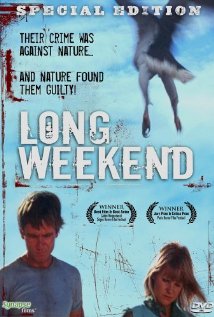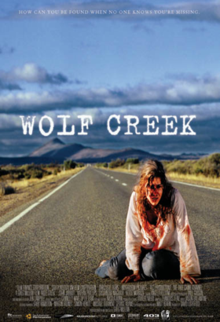Finishing up my Australian Horror with this double feature of Wolf Creek and Long Weekend. Honestly a random pairing but it ended up making a lot more sense than I realized it would.
After these movies, I should be moving on to Japanese Horror but Netflix hasn’t sent me any of those yet. I’ll figure out something for today but probably make up most of that next week with the zombies. This weekend the plan is still for adaptations. And Carrie. Most of this weekend is going to be about Carrie.
Matthew continues his posting on Women Directors over at Veryaware.com with American Mary and Surveillance. I also posted about American Mary in my viewing of Women Directors. And we actually agree! Amazing!
Don’t forget to join us this Sunday for another Google+ Hangout. We’ll be talking about all of these things.
Long Weekend, 1978. Dir Colin Eggleston, Written by Everett De Roche. Starring John Hargreaves, Briony Behets.
I have to be honest, I didn’t love Long Weekend. The story of a couple out on a camping trip in the wilderness of Australia whose weekend goes terribly wrong. I didn’t love it mostly because I couldn’t stand the couple, Peter and Marcia, and since they’re the only two characters of any significance in the movie we have to spend a lot of time with them.
Beyond not being my favorite movie though, there’s a lot of good stuff here. Especially in terms of Australian cinema. Released in 1978, it was part of the Australian New Wave as well as what’s been coined Ozploitation. I think Quentin Tarantino had something to do with that. The Australian New Wave marks the period of the 70’s and 80’s when Australia saw a resurgence in its film production after a sharp decline post WWII. There are some brilliant films from the time, two of my personal favorites being Walkabout and Picnic at Hanging Rock. Ozploitation specifically encompasses these horror films of the time, b-movie exploitation films filled with sex and violence.
Part of the reason we decided to look at horror films in the context of different national cinemas was to look at how the geography and culture of a film can influence its style and content, both visually and thematically. It’s fun to see how the films are the same. And, sometimes, how they’re different.
Long Weekend doesn’t come across as the most exploitative of films, I’m sure there are plenty worse out there, but it does have the elements. There’s nudity, violence, and plenty of shocks to take advantage of the R-rating.
I only really have a passing acquaintance with Aussie films. As I’ve mentioned, I love Walkabout. And I’ve seen a lot of Peter Weir. But beyond that and some Mad Max, that’s mostly it for me of the New Wave. So what did I find watching Long Weekend? It’s definitely very Australian!
But what does that mean beyond the accents? The Australian New Wave shares some similarity with the American films of the 60’s and early 70’s, think films like Easy Rider, as it was heavily influenced by the films of that period. Distinctly Australian though is the presence of the land itself, the focus on themes with an ecological bent, how nature itself plays a role in the narrative. It’s given an almost mystical quality, in Long Weekend sure but also in films like Picnic at Hanging Rock, The Last Wave, etc.
Being that the premise of Long Weekend is nature taking revenge on a couple that disrespects it, I guess it’s a bit obvious that Nature would seemingly have a mystical awareness, the animals themselves are sending the message to Peter and Marcia. While the film is beautifully shot and nature given its due respect by the filmmakers if not the characters, there’s something about it that still just really didn’t work for me.
Watching it, I felt like the whole thing could have been done in maybe half the running time. There just isn’t enough there to make for a satisfying feature length thriller. As I mentioned, Peter and Marcia are completely unlikeable and it’s hard to have any sort of sympathy for them. Honestly, I’m not even sure we’re supposed to feel any sympathy for them. A concept that would have worked fine if we only had to spend 20 minutes with them. As it is, by the end I was ready to stab them if the animals did hurry up and take care of it already.
It’s a cool idea and a fascinating watch if just in the context of the Ozploitation films in general.
How then does this film tie into the late revival in Australian horror that started in the early 2000’s? Let’s see!
Wolf Creek, 2005. Dir & Written By Greg McLean. Starring Nathan Phillips, Cassandra Magrath, Kestie Morassi, John Jarret.
Wolf Creek is a fairly straightforward horror flick about three campers who find themselves stranded in the outback. When they accept the help of a seemingly overly friendly local things go, well, downhill pretty quickly.
I didn’t think I was going to like Wolf Creek. Knowing its reputation for brutal violence and scenes of torture, I was prepared for something along the lines of Hostel. While it is brutal and there is torture, it wasn’t exactly what I was expecting. And while I still didn’t love it, I appreciate it.
Coming after the likes of Saw (another horror film by Australians), Wolf Creek was released right in the middle of the torture porn craze. It’s not just a slasher then, it follows the trend of its victims being brutalized and tortured. Where it differs from the likes of Saw or even the I Spit on Your Grave remake (we all know how much I loved that), is while the torture is clear, it isn’t glorified. There are no lingering shots of fish hooks being pierced through eyelids. Resisting the urge to make us watch an extended scene of violence and assault against one of the girls, we instead come to the action AFTER most of it has occurred. Rather than the violence itself being the most disturbing element of the scene, it’s actress Kestie Morassi’s performance. Her screams are more emotionally effective than the violence ever could have been.
It carries on the tradition of the New Wave in its use of the locations. The outback itself has such a presence. It traps the girls. Even if they escape the psychopathic serial killer, what are they escaping to? The elements, dehydration, exposure are just as sure to kill them as the man hunting them. One of the best sequences in the film is Krysty being chased barefoot down an empty stretch of highway by Mick. All the elements come together and in a scene reminiscent of The Hitcher, her fate becomes inevitable.
As in Long Weekend, it seems the outback itself is against their survival. Here too it has its mystical ability, their watches that stop for no reason, Mick’s ability to become one with it, he’s more a part of the land than he is a part of human society. Other than when he chooses to terrorize it that is.
Where the film is most successful though is in making us aware of our own role in watching these films. The film gets off to a slow start, the first 40 or 50 minutes are 3 kids on a road trip. Knowing it’s a horror film, it’s hard to not sit there wondering when the horror is going to start. When are we going to get to it? The film actually makes us WANT to see this violence and then obliges us by showing us the results of that wanting. The screams, the blood, the pain. We get what we asked for, we’re just as responsible for this girl’s pain as Mick Tyler is. We’re watching the movie after all, aren’t we? Clearly this is what we wanted.
Fun thought, right?
Unfortunately, Wolf Creek falls back onto that fatal flaw of the slasher film. Seemingly intelligent characters making insanely stupid decisions for the sake of the plot. Up until their captivity, Liz, Kristy, and Ben are all perfectly capable, perfectly normal kids. Liz then proves herself more than capable by escaping early in her captivity, outwitting Mick, and rescuing Kristy. Of course, if she were allowed to continue on this course of competency, there would be no movie. So early on, instead of either outright killing or at the very least restraining Mick, the girl’s leave him lying on the floor in a room filled with guns, knives, and various other instruments of torture. If there was any moral hesitation in killing him, which is questionable considering the mutilated body of another victim he has hanging in his torture room, they’re in a room of torture. How many different ways are there to tie people up in there? I’m guessing more than one.
This is just the first in a series of nonsensical, stupid decisions that have nothing to do with the characters rightly should have been doing. It’s hard to stay engrossed in a movie that seems to be trying really hard to take you out of it.
In any case, Wolf Creek is beautifully shot and while it’s a hard watch, for the most part it’s not a bad one. The legacy of the Australian New Wave is on display to great effect, as a reaction to Saw it’s quite effective, but unfortunately as a horror movie it doesn’t have the legs it needs to really stand on its own.



1 Pingback